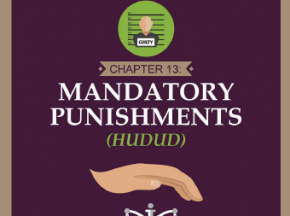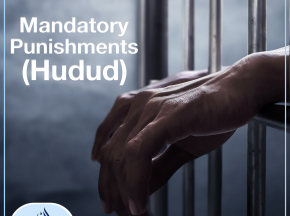content of level
Mandatory Punishments.
Mandatory Punishments.
Mandatory Punishments (Hudud)
The Arabic term hadd (plural: hudud) is defined as a punishment stated in Islamic law for encroaching on the limits set by Allah. It is also defined as a punishment stated in Islamic law, as a deterrent from committing a similar offence.
Drinking intoxicants
It tackles the ruling on drinking intoxicants in Islam, it is unanimously agreed that it is forbidden. The reason, punishment and conditions are discussed in detail.
Mandatory Punishments (Hudud)
Hudud are punishments for encroaching on the limits set by God, their legitimacy is based on the Quran, Sunnah and unanimity of scholars such as adultery and theft punishments.
Theft
Theft is forbidden because it is an aggression on other people’s rights and taking their property unlawfully.
The punishment for drinking intoxicants
The punishment for drinking intoxicants is 40 lashes, but it may be increased to 80 if the Muslim ruler determines that such an increase is needed to make the punishment a more effective deterrent.
Mandatory Punishments (Hudud)
The Arabic term hadd (plural: hudud) is defined as a punishment stated in Islamic law for encroaching on the limits set by Allah. The hudud aim to deter people from committing acts of disobedience of Allah. Thus, they help to spread security and reassurance in the community.
Learn Fiqh with Al-Hakeem | Mandatory Punishments
In this Lecture, Sh. Assim Al-Hakeem discusses and explains the Mandatory Punishments (Hudud).
Learn Fiqh with Al-Hakeem | Discretionary Punishments
In this Lecture, Sh. Assim Al-Hakeem discusses and explains the Discretionary Punishments. This course will cover all the practical rules that every Muslim, man or woman, should know, citing their bases in the Qur’an and the Sunnah.
Learn Fiqh with Al-Hakeem | Adultery
In this Lecture, Sh. Assim Al-Hakeem discusses and explains the Adultery. This course will cover all the practical rules that every Muslim, man or woman, should know, citing their bases in the Qur’an and the Sunnah.
Learn Fiqh with Al-Hakeem | Mandatory Punishments (Hudud) - part two
In this Lecture, Sh. Assim Al-Hakeem discusses and explains the Mandatory Punishments (Hudud).
Extent of punishment
Ta’zir punishment has no measures, they are left to the judge’s discretion, it can go as high as the capital punishment if it protects the community as in the case of spying crime.
Theft
Theft is a cardinal sin, it is an aggression on other people’s rights. The punishment for theft is cutting the hand of the thief, but there are conditions for this to be enforced.
Drinking intoxicants
This article tackles the ruling on drinking intoxicants in Islam, it is unanimously agreed that it is forbidden. The reason, punishment and conditions are discussed in detail.
Mandatory Punishments (Hudud)
Hudud are punishments for encroaching on the limits set by God, their legitimacy is based on the Quran, Sunnah and unanimity of scholars such as adultery and theft punishments.















